There’s been so much news recently we had to delay our two most recent ‘tomes’ to bring you coverage of the full debate. With this policy update being issued two days after the last we were hoping you’d breeze through a light read. However, Parliament has other intentions. Apprenticeships and FE have been big mentions this week, so far UK students aren’t deferring in droves, there’s new LEO data, the PM’s big speech wasn’t just about buildings, and – much fanfare – the R&D investment roadmap has been published (scarily it almost seems as if the writers have been paying attention to sector reports and campaigners recently). And the Minister for Universities thinks first in family children shouldn’t bother, at a stroke undermining huge efforts to widen participation in HE. Where next for that agenda, particularly given what the PM said? Levelling up doesn’t mean what you might think, it seems, or at least, not for other people’s children.
Parliamentary News
Kate Green was appointed as Shadow Education Secretary, she was the Shadow Minister for Work and Pensions (Child Poverty Strategy) and had previous parliamentary roles related to equalities and disability. Pre-parliamentary career she was a magistrate and a professional campaigner for children and single parents.
Boris’ Speech: The PM’s big economy speech on Tuesday covered schools, FE and the new blue-sky research agency but with little mention of HE. Here are the excerpts most relevant to our sector:
- We have umpteen fantastic, globally outstanding universities and yet too many degree courses are not now delivering value and for a century we have failed to invest enough in further education and give young people the practical training and further education they need.
- [Levelling up]…this moment also gives us a much greater chance to be radical and to do things differently to build back better to build back bolder and so we will be doubling down on our strategy we will double down on levelling up
- …to make this country – a Britain that is fully independent and self-governing for the first time in 45 years the most attractive place to live and to invest and to set up a company with the most motivated and highly skilled workforce and so we are investing massively now in education [schools details] and a vast £1.5 bn programme of refurbishing our dilapidated Further Education sector – dilapidated in many places, but not here of course because it is time the system recognised that talent and genius are expressed as much by hand and by eye as they are in a spreadsheet or an essay…
- …so when I say unite and level up, when I say build up people and build up talent, I want to end the current injustice that means a pupil from a London state school is now 50 per cent more likely to go to a top university than a pupil from the west midlands and that is not only unjust it is such a waste of human talent
- We will unleash the potential of the entire country and in those towns that feel left behind we have plans to invest in their centres and with new academy schools, new green buses, new broadband and we want to make them places where people have the confidence to stay, to raise their families and to start businesses and not to feel that the action is all in the cities or the metropolis
- … we know that [jobs] is our biggest and most immediate economic challenge that we face and so we will offer an Opportunity Guarantee so that every young person has the chance of apprenticeship or an in-work placement so that they maintain the skills and confidence they need to find the job that is right for them
- this summer we will be creating a new science funding agency to back high risk, high reward projects because in the next 100 years the most successful societies will be the most innovative societies and we in this country have the knack of innovation we lead the world in quantum computing, in life sciences, in genomics, in AI, space satellites, net zero planes, and in the long term solutions to global warming wind, solar, hydrogen technology carbon capture and storage, nuclear and as part of our mission to reach Net Zero CO2 emissions by 2050, we should set ourselves the goal now of producing the world’s first zero emission long haul passenger plane – Jet Zero, let’s do it
- and though we are no longer a military superpower we can be a science superpower but we must end the chasm between invention and application that means a brilliant British discovery disappears to California and becomes a billion dollar American company or a Chinese company and we need now a new dynamic commercial spirit to make the most of UK breakthroughs so that British ideas produce new British industries and British jobs
Greg Clark MP, ex-Secretary of State for BEIS, responded to the speech:
- I welcome the prominence of science and innovation in today’s speech from the Prime Minister. My Committee’s ongoing work relating to the COVID-19 pandemic has demonstrated just how indispensable, and how world-leading, science, research and innovation are in the UK. Innovation across every scientific discipline will play a critical role in economic recovery, making its place at the centre of recovery plans more essential than ever.
- My Committee has already launched an inquiry on the Government’s plans for a new science funding agency and we will hold oral hearings in the weeks ahead.
Research Professional comment on the speech: The BBC fact-checking service has looked at the prime minister’s speech in detail and has identified most of its spending pledges as either previously announced or inaccurate.
Value
Chris Skidmore wrote for Research Professional in his official capacity as a regular (monthly) columnist welcoming his co-Chair role of the Universities APPG and lamenting that universities still aren’t recognised for their value.
- It seems a cruel irony that the institutions which are at the forefront of research into how we escape out of the Coronavirus crisis, are also the ones which will be most badly hit by its impact. That irony extends to how poorly sometimes it seems we value our universities: unlike workers in the NHS, university staff and teachers have gone unrecognised in the remarkable efforts that they have made over recent months and still face hostile stories in the press.
He calls on Government to be clear about universities valuable role in the future [whereas currently they are tinkering with the mechanisms]:
- We cannot simply pay lip service to ‘our world-leading universities’ without setting out how they must play a role for the future, and without creating a financially sustainable model of funding teaching and research that ends once and for all the curate’s egg of university funding, split across departments, both in Whitehall and on campus.
- A long-term vision for what our universities are for, why they are needed, and what they can achieve for the future is essential.
- That does not mean, however, that it should be the responsibility of government simply to bail out universities so that things can continue unchanged…We need a new settlement upon which both the sector and the government can agree.
- Education will inevitably play an essential role in retraining and reskilling those who have lost their jobs in the economic downturn; the potential for higher education to create modular, step-on step-off, courses that blend with further education learning and to establish new forms of training is huge. But the wider importance of relationships and networks that universities bring together for the benefit of society, should be better explored.
- One obvious link is that between higher education and the NHS, which should be strengthened where possible.
- And the ‘civic university’ approach has massive potential to demonstrate and prove what universities can contribute to regenerating their local communities.
Much of this work is already underway at an institutional level, which brings me to my plea to institutions: just because you know it is happening, don’t assume that everyone else does
Disadvantage
Universities Minister, Michelle Donelan, spoke at the NEON summit on widening access and social mobility. BU’s Schools Liaison & Partnerships team ‘attended’ the full summit and hope to bring you full coverage of the juicy details of the event in next week’s policy update. Meanwhile Michelle:
- Praised the innovation the sector had shown in responding to the pandemic stating it was more important than ever to share good ideas and good practise
- Highlighted UpReach’s virtual internships
- On social mobility she said:
- But today I want to send a strong message – that social mobility isn’t about getting more people into university.
- For decades we have been recruiting too many young people on to courses that do nothing to improve their life chances or help with their career goals.
- True social mobility is about getting people to choose the path that will lead to their desired destination and enabling them to complete that path.
- True social mobility is when we put students and their needs and career ambitions first, be that in HE, FE or apprenticeships.
- Whatever path taken, I want it to lead to skilled, meaningful jobs, that fulfil their ambitions and improve their life earnings
- universities do need to do much, much more to ensure that all students – and particularly those from the most disadvantaged backgrounds – are recruited on to courses that will deliver good outcomes and that they have the confidence to apply and the information they need to make informed choices.
She goes over similar points later:
- Since 2004, there has been too much focus on getting students through the door, and not enough focus on how many drop out, or how many go on to graduate jobs.
- Too many have been misled by the expansion of popular sounding courses with no real demand from the labour market.
- Quite frankly, our young people have been taken advantage of – particularly those without a family history of going to university. Instead some have been left with the debt of an investment that didn’t pay off in any sense.
- And too many universities have felt pressured to dumb down – either when admitting students, or in the standards of their courses. We have seen this with grade inflation and it has to stop.
- … let’s be clear – we help disadvantaged students by driving up standards, not by levelling down.
And here reappears that old Theresa May chestnut of Universities ‘sponsoring/intervening’ in schools:
- But the onus must also be on universities to go further too, not just admitting disadvantaged students with good grades, but focusing even more on helping them to achieve and complete courses. And going the extra mile to raise standards and aspirations in schools.
- One of the most successful initiatives in this area has been specialist maths schools – which are sponsored by and attached to universities.
- Whether its science, languages, engineering or the humanities, universities should be doing all they can to raise attainment for the less fortunate and work with schools.
- That can be sponsoring schools, supporting a robust curriculum or running summer camps, universities have the potential here to make a tremendous difference in opening up opportunities.
- So, I want your access budgets not to be spent on marketing but on raising standards, providing the role models, the information, encouraging aspiration and highlighting the high quality opportunities available.
And just when you thought you’d hit the pinnacle of speech writers’ bingo we match a full house with the levelling up agenda and ‘transformation’ mention…
- …this Government was elected on a mandate to level up Britain, to deliver greater opportunities to every person and every community in the UK.
- Universities must play a vital role in helping to achieve this mission and helping to achieve the transformation of lives.
- So, today I’m calling for change, to start a new era on access and participation. One that’s based on raising standards, not on dumbing down; on putting prospective students and their ambitions and their needs first; on results and impact, not on box ticking and marketing; and on delivering graduates into jobs that really will transform their lives.
This looks like a potential huge change to the regulatory agenda on access and participation as well as setting the context for the TEF/Augar updates to come.
FE & Apprenticeships
The weekend’s news emphasised building the FE sector and apprenticeships alongside the additional rescue research pot news. Robert Halfon (Education Committee Chair) called for changes to the focus and use of the apprenticeship levy, alongside pushing for a guaranteed apprenticeship offer:
- Government should utilise the apprenticeship levy close the skills deficit primarily focused for young (16-24 years) apprenticeships from disadvantaged backgrounds and degree apprenticeships – not middle-managementMBA apprenticeships.
- Where possible, all new recruits to the public sector should be offered an apprenticeship
- The cost of the £3bn National Skills Fund should be redirected “towards the cost of funding the training of apprentices for non-levy payers. Alongside this, a wage subsidy for small and medium businesses — be that paying wages for the first year, or a lump sum upfront.”
- Universities should work towards 50% of their students undertaking degree level apprenticeships, using the levy and wage subsidies. The £800bn they spend on access and participation should be allocated to universities and grow their degree apprentice student numbers.
Research Professional have a good write up speculating on Halfon’s position on apprenticeships (before he made the guarantee speech). Including a quote from Nick Hillman, Director of HEPI,
…many universities have stepped up to the plate to help deliver apprenticeships, and with difficult economic times to come, we need more good opportunities for raising skills and keeping people off the unemployment queues. But the common tendency to attack traditional higher education when lauding apprenticeships is very unhelpful he added, criticising Halfon’s quote. It wrongly implies that we need less of one and more of the other. In fact, we need more opportunities of all sorts if this generation of school leavers are not to be scarred for the long term.
And this Guardian article (on admissions reform which we covered in Monday’s policy update) contains FE content in its conclusion: The new post-18 education policy proposals came as Williamson wants to move beyond the coronavirus pandemic aftermath, with measures to improve the status and attractiveness of further education, which it regards as a more cost-effective means of meeting the UK labour market’s skills shortage.
There were two meaty Education Committee sessions examining the impact of C-19 focussed on FE and apprenticeships last week, with mention of the FE white paper. You can watch both sessions here, or read the transcript.
An interesting survey (pre-Covid) carried out by the Engineering Construction Industry Training Board on apprenticeship report found:
- Mixed views towards the apprenticeship levy – 32% employers were positive; 19% negative.
- Only 16% of those surveyed in England said the apprenticeship levy had increased the number of apprentices in their business.
- SMEs surveyed had a more positive perception (45%) of the Apprenticeship Levy than large companies (29%).
- Employers also identified a number of challenges facing apprenticeship recruitment, with a lack of suitable work and no current need for apprentices cited by 81%, and a preference to hire graduates or experienced staff over apprentices expressed by 18% of respondents.
- Other barriers were lack of flexibility in off-the-job requirements (19%) and distance from training providers (29%).
- Many of those interviewed saw apprenticeships as a way of ‘giving back’ and providing an alternative to those who were not suited to or interested in further academic study, favouring a more technical approach with real work experience.
They made several recommendations to improve apprenticeships:
- Apprenticeships need better representation by Government, employers and in the mainstream media. Apprenticeships should be included as a destination at both 16 and 18 in school leaving measures and performance tables to bring them on par with further academic study and in media commentary as a destination at relevant school leaving ages.
- Apprenticeships need to be more clearly defined because the current definition lacks detail and makes it difficult to distinguish between new entrants and apprenticeships used for upskilling and reskilling existing staff.
- Apprenticeship delivery needs to be decentralised and led through collaborative, regional partnerships which include employers so the pipeline of new recruits aligns to local industrial strategies and skills shortages.
- Apprenticeship recruitment needs to be more inclusive to improve the diversity of the workforce. Employers should actively reach out and appeal to a wider community rather than relying on traditional recruitment processes.
- In England, more flexibility is needed around the requirement for 20% of training to take place off-the-job; more support is needed to allow courses to run with lower numbers of apprentices and to pay for apprentices to travel to and from both the employer and the training provider; and more alignment is needed with the upcoming T Levels to allow T level students to transfer into relevant level 3 apprenticeships.
And the APPG for Apprenticeships has called for evidence on how the sector has responded to the Covid-19 pandemic and what further work is required to improve apprenticeships policy for the future.
Student Survey
HEPI have a new survey of 1,000 undergraduates addressing their pandemic HE experience:
- 1 in 5 students (19%) say they have had ‘very clear’ communications on Covid-19 from their higher education institutions (down from 31% in March);
- 44% feel they have received clear communications about the next academic year from their HE provider
- 63% are satisfied with the way their HE provider has handled their remaining assessments for this academic year
- Fewer students are satisfied with the online learning replacement of face-to-face teaching than they when surveyed in March – 42% are satisfied, compared to 49% in March
- 44% are satisfied with the delivery of support services, such as careers and mental health support, during lockdown
- 57% are living away from their usual term-time residence. 30% have received a refund on accommodation costs or early release from a contract.
- Thinking about measures implemented ready for next year HEPI highlight a hierarchy of expectations
- 75% expect increased hygiene
- 71% expect some learning online
- 71% expect social distancing measures
- 26% expect limitations to courses
- 25% expect a delayed start to term
- 18% expect all learning to be online
Rachel Hewitt, Director of Policy and Advocacy at the Higher Education Policy Institute, said:
- The results show that students are realistic that the next academic year is likely to be radically different to the norm. They understand that some level of social distancing is likely to remain in place and blended teaching will combine online and face-to-face teaching. However, it is concerning that less than half feel they have had clear messaging from their university about the next academic year. While it is difficult to predict exactly where we will be by September, it is important universities are as clear as possible in their communications to students.
- Staff are working their socks off to get their campuses ready for the new academic year and we hope these results will help them prepare.
Shadow Universities Minister Emma Hardy responded to the report:
- These figures show that whilst universities have responded quickly and largely successfully to problems, there are still significant numbers of students not getting the support they need. Not all of this can be laid at the door of universities, which have had to meet the challenges with no meaningful help from government.
- It is paramount that the government provides the support needed so universities can feel confident in dealing with students over the impact of COVID-19 during the next academic year. The government must also provide increased support to students regarding their mental health and wellbeing and providing well-sourced and sufficient hardship funds to universities so no student gets into further debt because of the pandemic.
Graduate Outcomes
The latest provider level LEO (longitudinal education outcomes) data highlighting graduate outcomes was released late last week. The exciting development in this release was for the first time the inclusion of graduates who moved overseas. This new tracking feature had little impact on the overall outcomes but it highlighted, unsurprisingly, that languages students were most likely to move overseas. Next most likely to work outside the UK were physics and astronomy graduates.
The chart below shows the median earnings distribution per subject studying 5 years post-graduation.
Business and management had the widest range of earnings variation – from £17,900 to £75,900. With law incomes also varying greatly.
If you scroll down to the charts on earnings by subject and sex you’ll spot that male salaries (their median earnings) are more than female earnings in the majority of institutions except for Veterinary Studies and Performing Arts.
Wonkhe’s data guru provides his interpretation and some interactive charts on the LEO data release in this blog.
Research
R&D Roadmap
On Wednesday Alok announced the R&D roadmap (with accompanying written ministerial statement). The roadmap aims to chart a course to science superpower status (which Research Professional argue the UK already is) through public investment (£22 billion by 2024/25) attracting private investment, making science and talent central to tackling the major challenges facing society whilst being green, closing the productivity gaps and harnessing technology to transform everything (work, health, people, process, services). The Minister says: We can only make the most of the UK’s science superpower strengths by working with partners in government, academia, industry and charities across the UK. The roadmap marks the start of a conversation on what actions need to be taken and how to ensure our R&D system is fit for purpose now and for the future. We are engaging with the devolved administrations and other Government departments to ensure this is a cross Government and UK-wide discussion and will be undertaking a broader programme of engagement in the run up to the spending review this autumn.
Brief points from the roadmap (including those already announced):
- Increase R&D investment to 2.4% of GDP by 2027; public funding of R&D to £22 billion by 2024/25 – with the investment intended to leverage further domestic and international business investment into UK R&D.
- Diversity features frequently throughout the roadmap– access, workforce, innovation, international outlook. Our mission is to inspire and enable people from all backgrounds and experiences to engage and contribute to research and innovation and show that science is for everyone.
- Celebrate our successes far and wide, showcasing our strengths, and promoting the UK as a destination for talent and investment, and a partner of choice.
- Checking on the system to ensure the structural barriers aren’t impeding progress:
World-class research and dynamic innovation are part of an interconnected system; they depend on talented people and teams working in a supportive and diverse culture across multiple sectors, with access to the right funding, infrastructure, data and connections – locally, nationally, internationally – to do their best work. We will examine how this system is working across government, academia, universities, research institutes and technology organisations, businesses, charities, domestic and international investors, global networks and partners…
…we will make the bold changes needed to ensure our system is fit for purpose now and for the future. This will require tackling fundamental and challenging questions about our R&D priorities and addressing long-term problems in the system. It seems the Government has taken note of recent publications such as access to and diversity in doctoral research and a potential research bullying culture.
There’s an indicator of timescale …We will not be afraid to make tough choices to achieve this ambition. Many of these are for the UK Government and we will address these as we prepare for the Spending Review.
There are two full pages entitled being honest about where we need to improve (p9-10) covering bureaucracy, unhealthy work culture, Golden Triangle, national security issues, third party funding dependencies.
Similarly, in relation to innovation, the Government intends to: review how we fund and assess discovery and applied research, to cut unnecessary bureaucracy, pursue ambitious “moonshots”, and ensure that institutional funding and international collaboration can support our ambitions. More from page 49 onwards on this.
- An Innovation Expert Group will review and improve the system including strengthening the interactions between discovery research, applied research, innovation, commercialisation and deployment (and juggling the devolved elements).
- Focus is key – We will exploit competitive and comparative advantage where the UK can lead the world in key industries, technologies and ideas. And we will ensure we have the best regulatory system to support research and development. This includes supporting start ups and entrepreneurs and their access to finance.
- A new R&D People and Culture Strategy – we will increase the attractiveness and sustainability of careers throughout the R&D workforce – not just for researchers, but also for technicians, innovators, entrepreneurs and practitioners.
- Set up an Office for Talent – which will take a new and proactive approach to attracting and retaining the most promising global science, research and innovation talent to the UK. Research Professional highlight that this will need to work with the points based immigration system.
- The Global Talent Visa (launched in Feb 2020) will be extended to allow highly skilled scientists and researchers from across the globe to come to the UK without needing a job offer.
- International PhD students will be eligible for a three year work visa (from summer 2021 onwards); undergraduates and maters students remain at the two year visa level (Government has been listening again – you’ll recall Jo Johnson called for a four year visa recently).
- A new R&D Place Strategy – to unlock local growth and societal benefit from R&D across the UK (due later this year), which will likely involve building on the Strength in Places Fund. Page 32 onwards tackles Levelling up R&D across the UK. Commenting on this section of the report Research Professional state: But for all the noise the government makes on levelling up, there is nothing new in the roadmap about what this might mean in practice.
- Interestingly, the Government plans to: Provide long-term flexible investment into infrastructure and institutions. This will allow us to develop and maintain cutting-edge research, development and innovation infrastructure, with agile and resilient institutions able to play their fullest role. We will build on the UK’s system of universities, public sector research establishments and other publicly funded laboratories, developing our large-scale infrastructure, facilities, resources and services to make them world-leading. (See more from page 47.)
- A new funding offer for collaboration to ensure the UK can further benefit from the opportunities of international scientific partnerships. Be a partner of choice for other world-leading research and innovation nations, as well as strengthening R&D partnerships with emerging and developing countries. This will create new opportunities for collaboration, trade, growth and influence. We aim to maintain a close and friendly collaborative relationship with our European partners, seeking to agree a fair and balanced deal for participation in EU R&D schemes. If we do not associate to programmes such as Horizon Europe, we will meet any funding shortfalls and put in place alternative schemes.
- Creating the ARPA style body (‘at least’ £800 million) to set up a unique and independent funding body for advanced research, modelled on the US’ Advanced Research Projects Agency (ARPA). This body will back breakthrough technologies and basic research by experimenting with new funding models across long-term time horizons. The new body will collaborate internationally, championing bold and transformative R&D. Research Professional (RP) note that Boris promised ARPA would be created during the summer, however, as the new body will require legislation to create it and there are only three sitting weeks of Parliament left it seems likely it’ll begin to form in the Autumn at the earliest. RP also state that there isn’t a firm commitment to joining the European Innovation Council, which under Horizon Europe will be an Arpa-inspired funder of deep-tech-based innovation and entrepreneurship.
Specifically on HE the roadmap states:
We will refresh our relationship with universities in England to ensure that their research activities are sustainable and delivering even greater impact, and that their diverse roles in innovation and regional growth are supported and strengthened. We will review how we fund university research, ensuring that we support the highest quality research areas to grow efficiently with the minimum of bureaucracy
We will work with the higher education sector in England to agree a set of reforms to support university research and knowledge exchange to become more resilient, more efficient and ensure better outcomes from public funding. A new ‘compact’ between government and universities in England could strengthen accountability for discretionary funding, potentially bringing together existing separate higher education research concordats, reducing bureaucracy for institutions and their staff. We will work with the devolved administrations to ensure coherence of approaches across the UK.
Alongside this, we will be reviewing the mechanisms which we use to support university research in England and the incentives that these create within the R&D system. This includes the core block grant funding known as Quality-related Research (QR), which is used at universities’ discretion to fund a broad range of activities, including the work which universities undertake with businesses and other partners, and the nurturing of higher risk and emerging areas of research – especially early career research. We will continue to work closely with UKRI and the devolved administrations to achieve a healthy balance between QR (and its devolved equivalents) and the more directed funding that we provide to projects and people, ensuring that we maintain a vibrant and diverse research base which can respond flexibly to economic and societal challenges. And when we evolve the Research Excellence Framework after the current exercise is complete, we should aspire to run a system which is fair, unbureaucratic and rewards improvement.
In addition, we will work with other funders to consider opportunities to fund a greater proportion of the full economic cost of research projects in universities. This includes asking whether government should fund at a higher rate, to safeguard the sustainability of the research we fund. We must balance this with the need for research funding to be efficient and to protect universities’ ability to deploy their own resources strategically on research issues of particular importance to them. (Has the Government been listening to the Russell Groups’ lobbying for full economic costing?)
The roadmap receives the expected criticism for lack of detail and is best viewed as a series of policy commitments with Treasure backing (it is similar in approach to the Industrial Strategy). It states This Roadmap is the start of a big conversation on what actions need to be taken and how…Over the coming months we will develop the proposals in this Roadmap in a comprehensive R&D plan working very closely with the devolved administrations where plans cover or impact on their devolved policy responsibilities. This plan will only be effective if it is developed with people and organisations across the UK. We welcome responses to the high-level questions (survey).
Research Professional dissect the Roadmap is their usual entertaining way and have an article introducing the Roadmap from Amanda Solloway (Science Minister).
Alistair Jarvis, Chief Exec UUK, stated:
- We welcome recognition of the role that university-based research and innovation activities will play in driving the UK’s social and economic recovery post Covid-19 and the particular focus on tackling climate change, developing new medicines, attracting the best scientists and researchers from around the world and addressing longstanding challenges around the sustainability of research activity.
- The news that the new Graduate Route will be extended for PhD students to allow them to remain in the UK for three years after study is a bold policy move which will increase the UK’s competitive edge in the global competition for talented research students. The announcement of the Graduate Route is already having a huge impact on the UK’s attractiveness as a destination. It will give a competitive offer to some of the brightest minds from across the world who bring huge benefits to university campuses and local communities and can help to build the economy. The commitment to excellent customer service across the immigration system, so that it is simple, easy and quick recognises the benefits of attracting international talent and students to the UK, is a positive and welcome move.
Strength in Places Projects Alok Sharma, Business Secretary, announced a £400 million boost to regional R&D projects across the UK by funding 7 projects across the UK through the Strength in Places Fund. The Government (£186m) and industry (£230m) supplied funding forms part of the commitment to invest 2.4% of GDP in R&D and the Fund itself aims to drive local economic growth. The projects include zero-emissions tech for maritime vessels, smart-packaging to cut food waste, understanding and addressing financial behaviours, selecting medicines based on a patient’s genetics, and new health products to combat infections.
Business Secretary Alok Sharma stated:
- Today’s announcement will ensure some of our country’s most promising R&D projects get the investment they need to take off and thrive. Working with the private sector our world-class universities, we’re backing new and innovative ideas that will create jobs and boost skills in every part of the UK for years to come.
There was also an announcement on the extension of the Future Fund for businesses.
Letter Outgoing Chief Executive of UKRI, Sir Mark Walport, wrote an open letter to the research and innovation community setting out UKRI’s achievements during his tenure and praising how the research sector has been instrumental in responding to the C-19 pandemic.
REF 2021 The REF team ran a webinar and are consulting on further changes to REF 2021 to adapt to the pandemic disruption. Also the nomination window to sit on the sub-panels is now open.
C-19 Research Funding The NUS are concerned the Government’s additional research rescue proposals (contributing to the loss of international student fees which often subsidise research) will increase inequalities:
- The concerns of university leaders are clearly being heard in government. However, we are extremely concerned that only a select group of universities will benefit from this package. To offer funding to the research intensive parts of our education system, while only offering restructuring for teaching intensive universities and colleges, threatens to intensify inequalities in our education. It is the institutions which have the largest proportions of disadvantaged students which could suffer the most, turning back the clock on access to higher education.
- Students, graduates and their families will be deeply disappointed to see another government announcement of funding for universities with no thought given to money for students. Students have been left jobless. Many are reliant on food banks, without access to Universal Credit. We need hardship funding that every single person in need can access right now.
Parliamentary Questions
Disability
The OfS have been prolific publishers during the pandemic. Their latest briefing note addresses the impact of C-19 on disabled students and applicants.
- Many disabled students already face challenges during their time in higher education that students without a known disability do not…disabled students are less likely to continue their degrees, graduate with a good degree, and progress onto a highly skilled job or further study.
- …there is a risk that the pandemic may be exacerbating these challenges and creating new issues, particularly if students are unsure of how to access study support or financial aid. It is also particularly important that disabled prospective students can continue to access advice and guidance to help them to make informed decisions about their higher education options.
The briefing note responds to concerns directly raised by disabled students and highlights good practice from HE institutions. It also looks forward discussing – the potential for the current expansion of remote learning and inclusive assessment processes to benefit disabled students if incorporated into longer-term teaching approaches.
Graduate Internships
UUK have published We are together – Supporting graduates in a Covid-19 economy calling for a one-year paid internships scheme to be on offer for 2020 graduates to help them get a foothold on the employment ladder. UUK believe the internships would support graduate employment prospects and help businesses get back on their feet post-lockdown. UUK see the LEP (local enterprise partnerships) as integral to the creation of the internships both targeting businesses most in need and channelling recent graduates into the local community. Key points:
- Targeted support for universities and businesses to set-up paid internship opportunities for graduates.
- Greater support to co-ordinate graduate internship opportunities including better communication of existing schemes.
- An in-study interest break on the Postgraduate Master’s Loan to encourage more – including those from poorer backgrounds – to consider postgraduate study.
- Policy change to support a growth in modular and bitesize learning opportunities to help meet immediate business needs.
Joint working with universities, LEPs and businesses with support from the UK government could create fair and meaningful opportunities for young people and ensure this crisis does not lead to a rise in unpaid internships – and reverse the hard-won progress the sector has begun to make on social mobility. UUK is happy to work with government, the Office for Students, and other relevant bodies on the different ways any additional support for this scheme could be provided and allocated.
Professor Julia Buckingham, UUK President and VC Brunel University, stated: Universities have been offering widespread support to help this year’s graduates find jobs and, while some employers are still running recruitment programmes online, the fact remains that there are thousands fewer jobs this year. Government support to incentivise and grow paid internships would benefit both graduates and employers, creating impactful opportunities for these young people and supporting the economic recovery.
Mark Bretton, LEP Network Chair, said: LEPs are already working with HE and FE partners on their LEP Boards to build the recovery and invest in the future lives of local young people. The graduate paid internship proposal from UUK is a logical extension of that work and would prove an effective way to support new graduates, help local businesses, boost the local economy, and contribute to the national recovery.
We look forward to discussing the design and details with UUK and the government, and hope to explore how we can widen the initiative to include other areas like the FE sector. Our partnership with UUK on the Graduate 2020 programme is a natural fit, ensuring funds are targeted based on the needs of local businesses, particularly SMEs, and the priorities identified by LEP Skills Advisory Panels and Growth Hubs as part of economic recovery planning. The partnership clearly demonstrates how LEPs and universities can work together, not only to support business, but to help young people build their lives in one of the most economically challenging periods of modern times.
Liam McCabe, President of NUS Scotland, said: We welcome these proposals from UUK and urge government to implement them. In particular, investment in widening access to postgraduate study and more modular and bitesize learning opportunities will be essential to graduates’ and the UK’s future.
Stephen Isherwood, Chief Executive of the Institute of Student Employers (ISE), commented: The current crisis is likely to have a long-term negative impact on the career prospects of the 2020 and 2021 graduating cohorts. Employers facing significant financial challenges, particularly small and medium sized enterprises, will struggle to provide internships and entry level jobs in sufficient quantities to meet students’ needs.
A government funded stimulus package that encourages businesses to invest in young people will boost both the employment prospects of students and the skills base of the UK economy.
Matthew Percival, People and Skills Director at the CBI, said: Graduates face a challenging labour market due to the impact of coronavirus. Businesses will do what they can to ensure that young people have opportunities as the economy restarts, but a new partnership between companies and government is needed. Financial incentives to create jobs and training opportunities earlier in recovery will be vital to reducing youth unemployment.
Admissions
UCAS have confirmed a rise in the number of students accepting places to start HE in September 2020 start. UK applicants accepting a place are up by 1% (2,200 more) compared to 2019. EU acceptances have fallen by 6% with UCAS stating this needs to be seen alongside the overall dwindling EU application numbers. Overall for UK applicants less have deferred their university place than in 2019. With 290 students less opting to defer (2% less overall). However, applicants from outside the EU have increased in number choosing to defer, up by 21% (200 more deferrals). UCAS suggest this deferral rate should also be set in the context of the increased volume (+15%) of non-EU applicants this year. While less UK applicants overall have chosen to defer unfortunately there is a disadvantaged element. UCAS have also examined the POLAR data showing a small increase in applicants from the most disadvantaged area (quintile 1) selecting to defer (+60 applicants, up by 6%)
Parliamentary Questions
Students
HE Sector The importance of good indoor ventilation.
Student Number Controls
Some parliamentary questions provide new content on the student number controls:
In case you missed it previously – confirmation that degree apprenticeships are not counted within the student number controls.
On the reasoning behind the thresholds set for the student number controls Donelan explains:
- The intention is that it is simple, competitive and places minimal burden on higher education providers.
- The Teaching Excellence Framework (TEF) Year Four data was used…It is publicly available and requires no additional aggregation or calculation, ensuring transparency. Other data sources are or will be available, but do not average across multiple years of data as is done in TEF.
- The…minimum qualifying thresholds, ensures that the 5,000 places are awarded on a competitive basis, by restricting eligibility to only the top performing providers.
Deferring students – Donelan dials back on last week’s pro-student choice rhetoric stating: If students do want to defer, it is a matter for individual providers and not the government, so students should speak to their providers directly to determine what flexibility exists.
And the competition for the 5,000 extra healthcare places has been reopened (after institutions had already made their bids and after the original deadline closed). Nursing Times say this is because the Government are planning to free up further funds to increase the places above the 5,000 limit due to ‘significant demand’. It will also provide more time for universities to ensure there are enough clinical placements for increased numbers of new students. As reported last week UCAS have confirmed there are vacancies on all nursing specialism courses, despite applications being up by 6%.
Matt Hancock, Health and Social Care Secretary of State, said:
- Following the fantastic news last Thursday that we have over 12,000 more nurses working in our NHS compared to last year, we have seen huge demand from universities for the additional places we’ve made available on nursing, midwifery or allied health courses.
- This pandemic has demonstrated just how important our healthcare professionals are, and the demand for places shows that there are thousands of prospective students looking to train for rewarding careers in our NHS.
HE Sector Finances
Research Professional report on a [leaked] briefing note written by the Department for Business, Energy and Industrial Strategy, seen by Research Professional News, explains that several government departments are working together “to develop a process through which higher education providers at risk of closure will be able to apply to government to access a restructuring regime as a last resort”
There will be “attached conditions” wherever the government decides restructuring is needed, BEIS wrote, and the regime “will look to support teaching intensive institutions where there is a case to do so and where intervention is possible and appropriate.
There is nothing unexpected in this, the mood music throughout the pandemic is that the Government will not bail out providers who are financially insolvent. Although there has been suggestion they will step in and intervene ensuring changes relevant to the Government’s agenda are made in return for keeping the institution running (in the short term) – leading some to suggest institutions would be unrecognisable after intervention, including the sale of properties and land.
Lords Debate
The Lords debated the parliamentary question: To ask Her Majesty’s Government what support they are providing to universities to assist them in dealing with the impact of the COVID-19 pandemic. In essence the Government representative (Lord Parkinson of Whiley Bay) received quite a grilling whilst he maintained the party line of stating the range of support methods the Government has put in place for the HE sector. Just a few indulgent excerpts here to highlight that Lords are fighting the HE corner:
Baroness Randerson: My Lords, the Government’s recent announcement provides little new money, and 75% of that will be in loans. Universities’ research is heavily subsidised by international student fee income, which is predicted to drop by £2 billion this year. Many universities have made massive contributions of equipment, research and staffing to the fight against coronavirus. Does the Minister accept that they now need a much more ambitious package of support, because they are making research and staff cutbacks at this moment?
Lord Parkinson Of Whitley Bay :The noble Baroness is absolutely right to point out the vital contribution that universities are making to solving the pandemic, which is putting pressures on them as well as on everybody else. She referred to the further package of support which the Government announced this weekend. In addition to bringing forward the tuition fee payments which I mentioned in my Answer, the Government are providing a package of support to universities to continue research and innovation. That includes £280 million of taxpayer funding available to sustain UK Research and Innovation and national academy grant-funded research, which is available immediately. From the autumn, there is a further package consisting of low-interest loans with long payback periods and supplemented by a further amount of government grants. I am therefore not sure that I accept what she says about the Government’s response being inadequate.
The Lord Bishop Of Winchester: My Lords, universities make a significant contribution to their local communities and economies, particularly smaller institutions that attract a larger proportion of students from disadvantaged backgrounds. These make a significant contribution to their local context, particularly in this pandemic…How will the Government work with higher education institutions to maintain the widening of access and retention of students, especially those preparing for key public service roles that have been so important during this pandemic crisis?
Lord Parkinson Of Whitley Bay: …I am pleased that higher education providers can draw on existing funding, which is worth around £23 million a month at the moment, to provide hardship funds and support for disadvantaged students who are particularly affected by Covid-19.
Lord Craig Of Radley: My Lords, many university students in England have been missing tuition and access to libraries, laboratories and other university facilities, and may face financial hardship. The Minister says that the Government will not cut the amount paid to universities in tuition fees, but will they reduce sums to be recovered from formerly affected students in later life?
Lord Parkinson Of Whitley Bay: The noble and gallant Lord is right to point out some of the many ways in which the university experience is being affected by this pandemic with regard to access to libraries, laboratories and so on. I am pleased that universities across the sector have responded swiftly and creatively to ensure that they remain open and that students can continue to avail themselves of high-quality education. Universities are autonomous and responsible for setting their own fees, and of course, as they approach the forthcoming academic year, if they decide to charge full fees, they will want to ensure that they can continue to deliver courses which are fit for purpose and which help students to progress their qualifications. However, any matter regarding the level of those fees and refunds is first and foremost for the providers and those who apply to them.
Vis Count Chandos (Lab): In the absence of more appropriate emergency grant funding to compensate for irrecoverable loss of revenues, the Government have encouraged universities to apply for business interruption loans. How does the Minister think these loans, designed for profit-making companies, can be repaid by non-profit HE institutions, other than at the expense of the quality of courses for future generations of students?
Lord Parkinson Of Whitley Bay:…he is also right to point out the wider societal benefits that universities bring, which is why the Government brought forward the additional package of measures which I outlined in my Answer.
Baroness Garden Of Frognal (LD): My Lords, what plans do the Government have to reform student and university funding to enable a greater number of people, especially mature learners, to undertake short higher education courses and build up to a full degree in a way that suits them? That will be increasingly important as individuals reskill post Covid.
Lord Parkinson Of Whitley Bay: The noble Baroness is absolutely right that many mature students and others may wish to consider courses of different lengths and varieties, and the Government are glad to see that wide range of courses offered. As she says, that will be particularly important over the coming months. The package of support which the Government have announced is of course available to providers irrespective of the length and format of the courses they offer.
Lord Norton Of Louth (Con):… Given how crucial that export is and that from next year EU students will no longer be subject to home fees, will the Government consider extending the new graduate route post-study work visa to three or four years to ensure that the United Kingdom has a competitive offer to international students?
Lord Parkinson Of Whitley Bay :My noble friend draws attention to the new graduate route which comes into effect from next summer, which allows people graduating from UK universities to stay here in work of any level and any remuneration for up to two years— an increased and very generous offer. That is part of the Government’s ambition to increase the number of international students coming to study here in the United Kingdom.
Inquiries and Consultations
Click here to view the updated inquiries and consultation tracker. Email us on policy@bournemouth.ac.uk if you’d like to contribute to any of the current consultations.
Other news
Online: Open University VC Tim Blackman writes about digitally rendered online learning, how selectivity has become a misnomer for prestige, and their new thrust to attract young learners.
Easing lockdown: The House of Commons Library has published a briefing paper discussing the impact of the easing of lockdown restrictions on the FE and HE sectors in England.
EdTech: Articles on edtech are a dime a dozen during lockdown. This week’s offering is in a similar vein.
Lockdown placements: Wonkhe have a blog exploring how universities need to adapt content, assessments and requirements where placements have fallen during lockdown because the employer hasn’t offered a remote alternative.
Staying at home: The Guardian have an opinion piece on commuter students.
German HE: Research Professional report that private HE institutions have doubled their student numbers in the last decade in Germany. 8.5% of the student population attend a private university; they are particularly popular with part-time and already employed students. Of all German part time students nearly half (48%) chose a private provider and 41% of distance learners also opted for this type of provider. The most popular subjects were economics, law and social sciences.
Subscribe!
To subscribe to the weekly policy update simply email policy@bournemouth.ac.uk.
JANE FORSTER | SARAH CARTER
Policy Advisor Policy & Public Affairs Officer
Follow: @PolicyBU on Twitter | policy@bournemouth.ac.uk


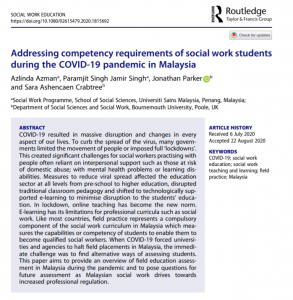
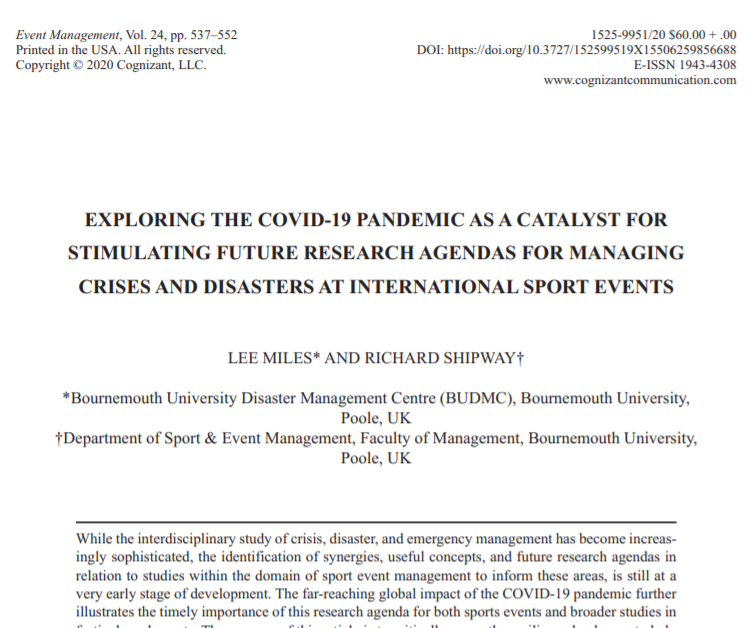

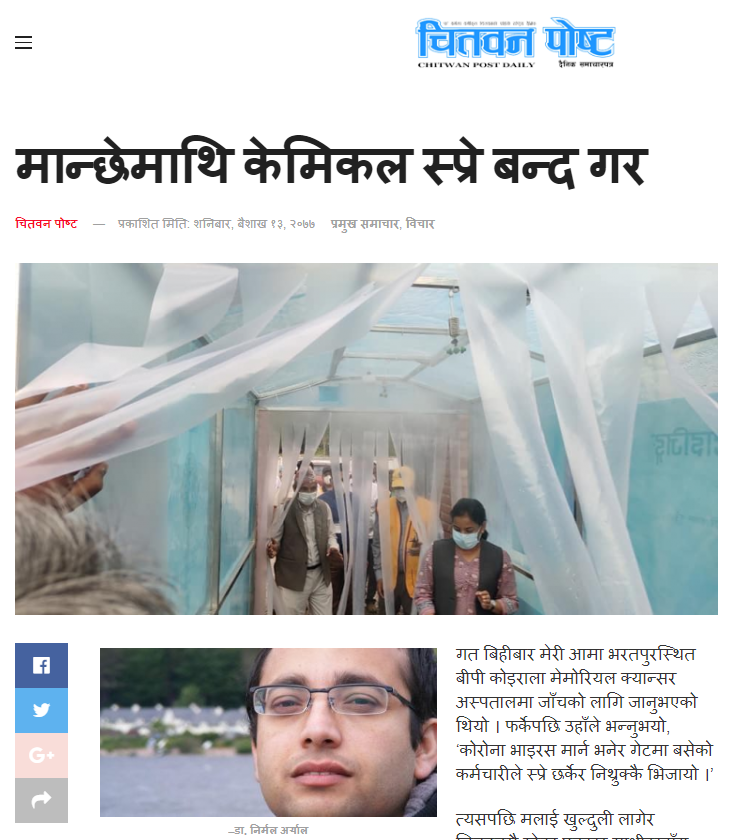
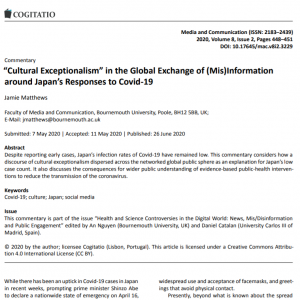



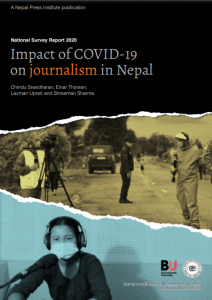
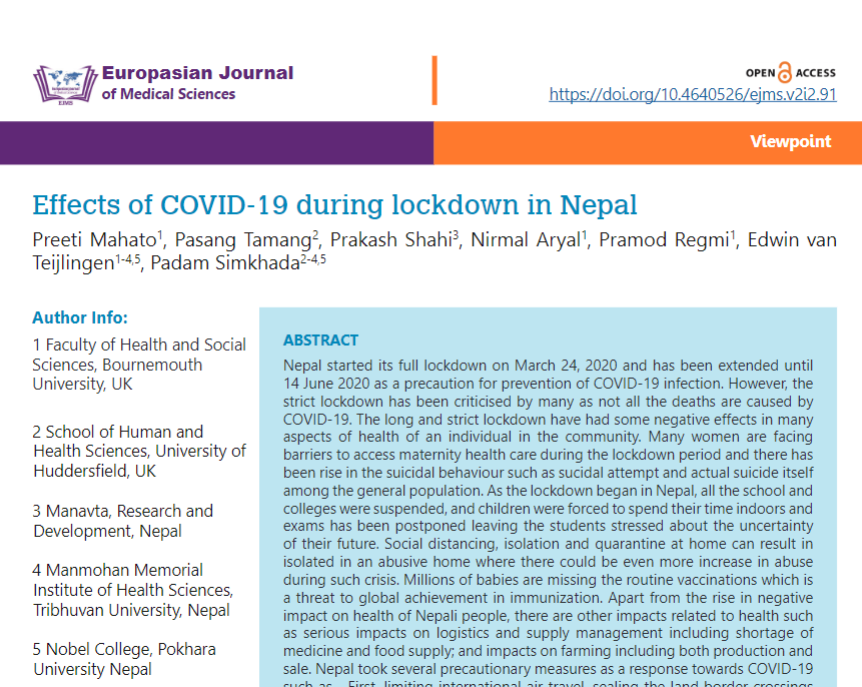
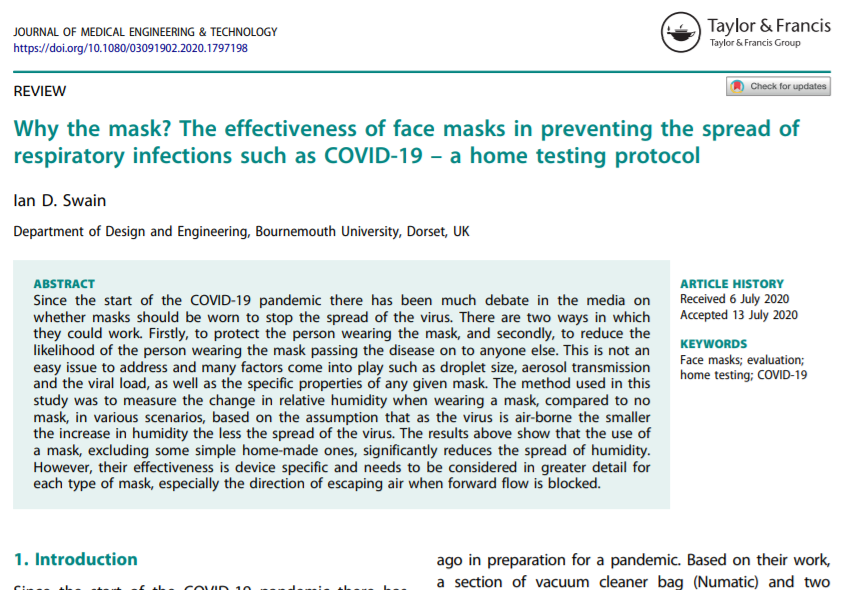
















 Conversation article: Why so many people drown at the water’s edge
Conversation article: Why so many people drown at the water’s edge Workshop on longitudinal studies in three countries
Workshop on longitudinal studies in three countries New Bournemouth University public health paper
New Bournemouth University public health paper New ACORN-funded paper published. When time is short but passion for food is strong, food day-tripping may be the answer!
New ACORN-funded paper published. When time is short but passion for food is strong, food day-tripping may be the answer! Royal Society of Chemistry Outreach Fund: Open for Applications
Royal Society of Chemistry Outreach Fund: Open for Applications Last reminder – MSCA Postdoctoral Fellowships 2024 internal deadline next week
Last reminder – MSCA Postdoctoral Fellowships 2024 internal deadline next week Horizon Europe – EuroHPC and MSCA PF webinars
Horizon Europe – EuroHPC and MSCA PF webinars